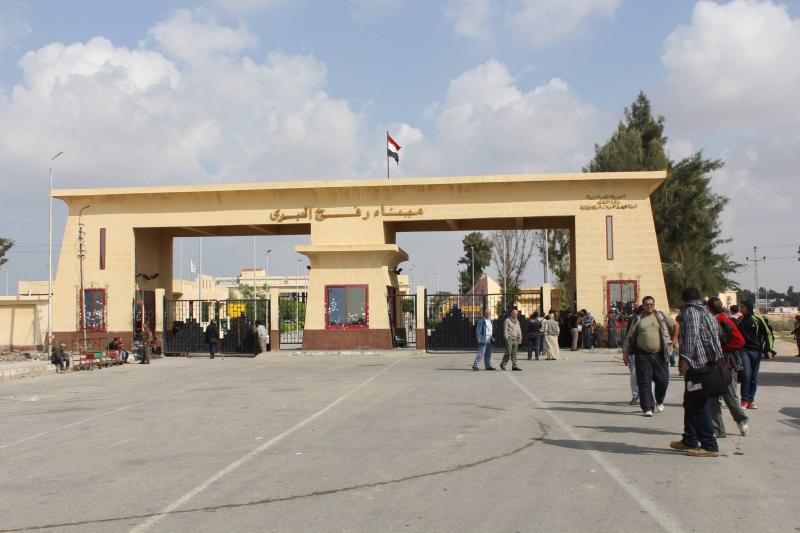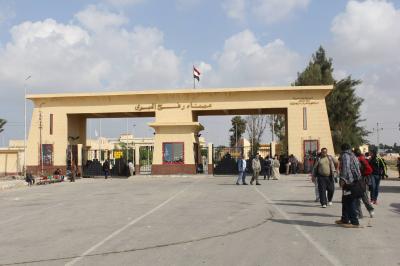Egypt reiterated that "it alone and no one else is responsible for the procedures for the return of Egyptians from the Gaza Strip," following renewed debate over the rules for exiting Gaza through the Rafah land crossing. This came after activists published statements made by Egyptian Foreign Minister Sameh Shoukry during an interview with CNN in Washington, where he indicated, in response to a question about the prolonged process of Americans and foreigners exiting Gaza through Rafah, that this was related to "agreements that could be made with Hamas and Israel, with the assistance of the U.S. special envoy for humanitarian affairs in the Middle East, Ambassador David Satterfield." He noted that the matter was "entirely up to the Israelis to determine and provide lists of individuals who can exit."
The spokesperson for the Egyptian Foreign Ministry, Ambassador Ahmed Aboul Gheit, described the situation as "attempts by some to distort official statements regarding the procedures for the entry of 'foreigners' into Egypt from Gaza via the Rafah crossing," stating in a post on his official account on the platform "X" (formerly Twitter) that such attempts "only reflect the despair of their authors." He added, "We reiterate once again, leaving no room for doubt or contention, that the Egyptian authorities are solely and exclusively responsible for the procedures for the return of Egyptians from the Gaza Strip."
This is the second time within less than a week that the Egyptian Foreign Ministry has issued an official comment on this matter. The ministry released a statement last Tuesday affirming that it was "responsible for organizing the return of Egyptians from Gaza." The first statement was in response to remarks made by former Egyptian parliamentarian and head of the "Middle East Forum for Strategic Studies," Dr. Samir Ghattas, during a meeting with journalist Amr Adib on MBC Masr, regarding sending lists of those wishing to exit the Palestinian enclave to the Israeli authorities for their approval, ensuring that these names had no connections to Hamas.
The Egyptian Foreign Ministry's spokesperson clarified at the time that the Egyptian representation office to the Palestinian Authority in Ramallah and the consular department of the Ministry of Foreign Affairs receive the names and documents of citizens wishing to return to their homeland, whereby detailed lists are prepared to submit them to the relevant Egyptian authorities in preparation for delivering them to those managing the Rafah crossing from both the Egyptian and Palestinian sides to facilitate their crossing from Gaza to Egyptian territory.
The spokesperson denied any media speculation conflicting with this regarding the procedures for the return of Egyptians from Gaza to Egypt, urging caution and accuracy when circulating any incorrect information attributed to unofficial sources. Renewed discussions about entry procedures from the Rafah crossing attracted attention from activists on social media. Egyptian parliament member Mostafa Bakry commented, stating that this information was "completely incorrect," reiterating that the minister's comments were about the slow process affecting foreigners due to Israeli procedures determining the names of foreigners.
Bakry also quoted the Egyptian Foreign Ministry spokesperson, stating that "this matter is confined to foreigners; the names of Egyptians are never presented to the Israeli authorities for entry through the Rafah crossing. This has not happened and will not happen." He added, "The Egyptian Foreign Ministry spokesperson informed me in a recent phone call that the information being circulated is misleading and out of context, and called for adherence to ethical guidelines."
Meanwhile, former Assistant Foreign Minister, Ambassador Hussein Haridi, described the use of Foreign Minister Sameh Shoukry's statements regarding the rules for the exit of foreigners from the Rafah crossing as "an intentional distortion and falsification of the truth," emphasizing that the minister's comments were clear and focused solely on the exit rules for "foreigners" without addressing any rules concerning the exit of Egyptians.
Haridi did not rule out that there could be "political motives behind the deliberate distortion and stirring confusion among Egyptian public opinion," linking the repeated highlighting of the issue to the presidential elections in Egypt starting Sunday. He indicated that the Foreign Ministry's first statement was explicitly clear, deeming the insistence on discussing the matter in a misleading context to have ulterior motives beyond clarifying the truth.
The exit of foreigners and dual-national Palestinians from the Gaza Strip via Rafah began on October 21st, coinciding with the entry of aid into the region, as Cairo linked the permission for the exit of foreign nationals to the entry of humanitarian relief aid. Meanwhile, Egyptians periodically post on social media platforms pleading with Egyptian authorities to assist them or their relatives in leaving Gaza.




